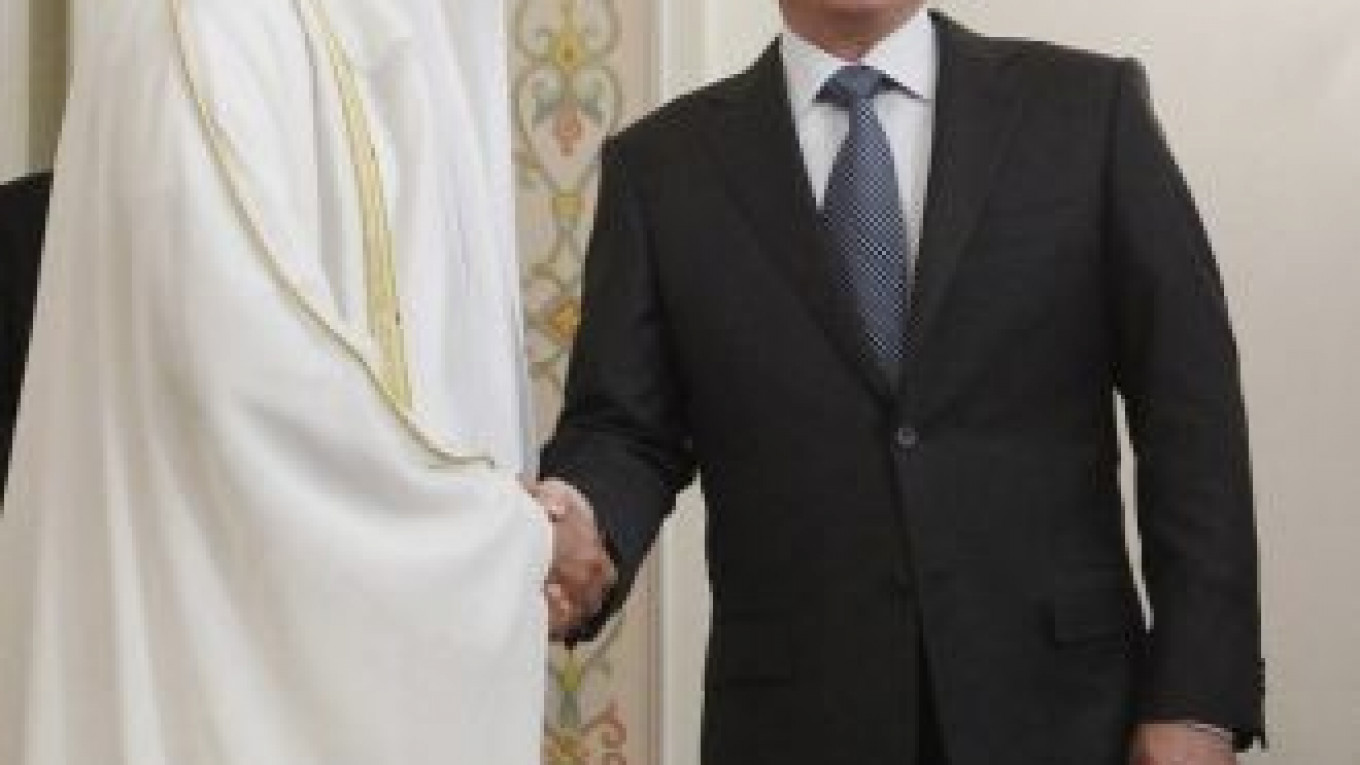Another Arab investor on Thursday tentatively agreed to set foot in Russia, setting a record with its possible commitment of $5 billion.
The emirate of Abu Dhabi's Department of Finance will invest in a partnership with the Russian Direct Investment Fund, the fund said in a statement.
Announced during a meeting of President Vladimir Putin and Crown Prince of Abu Dhabi Sheikh Mohammed bin Zayed Al Nahyan, the partnership deal calls for joint financing to build roads, ports and other Russian infrastructure.
The potential contribution of the Arab partners has elicited a superlative description from Kirill Dmitriyev, the chief of the Russian fund.
"Their $5 billion contribution is the largest investment from the Middle East ever made into Russia as well as one of the largest into an infrastructure fund globally," he said in the statement.
Hamad Mohammed Al Hurr Al Suwaidi, chairman of the Abu Dhabi Department of Finance, said the commitment to invest up to $5 billion reflected Abu Dhabi's belief in the returns from the future investment in Russian infrastructure.
Crown Prince Al Nahyan used an infrastructure notion to comment on the agreement.
"I thank you, your excellency, for giving us a chance to build this new bridge for relations with Russia," he said in the meeting with Putin, according to a transcript on the Kremlin website.
The partnership emerged not long after Mubadala, another fund from Abu Dhabi, in June agreed to invest up to $1 billion alongside the Russian Direct Investment Fund. Last year, the Kuwait Investment Authority pledged $500 million to a joint fund with the Russian investment vehicle.
The Kremlin said Wednesday in a statement, which announced the crown prince's visit, that Russia and Abu Dhabi had completed building the legal groundwork that would make Arab investors feel more comfortable putting money into Russian projects. A bilateral agreement to protect mutual investments took effect in August, while an agreement that regulates taxation of investment returns entered into force in July.
Vladislav Senkovich, an Arab relations expert at the international economic cooperation department of the Russian Chamber of Commerce and Industry, expressed reservations about the prospects of tapping Arab money. He said the earlier agreements of joint investment, which did not involve the Russian Direct Investment Fund, did not materialize.
Senkovich pointed to two separate deals that state corporation Rostec signed in 2010 with seaport operator Gulftainer and real estate developer Damac Holding for the Arab companies to invest $500 million and $300 million in Russia, respectively.
Speaking of the latest partnership, he said, "No money has been transferred yet. … It's early to give rosy comments, for the time being."
On the other hand, Gulftainer has taken on an investment commitment in Russia on its own. In September 2011, it announced it would operate the port of Ust-Luga on the Baltic Sea and plough $275 million in its development. It did not say if that meant taking a stake in the port.
Earlier this year, Gulftainer vice-chairman Badr Jafar said the company was in talks with the government and private companies in Russia to expand its operations, Bloomberg reported. The expansion, if any, will not necessarily be only into new ports, but could also target related logistics including in-land container depots and rail, he said.
In addition to Rostec, another state corporation that is interested in attracting Arab capital is Russian Railways. Its vice-president Alexander Saltanov said in June that the company was negotiating with the Bahraini Riyada Group.
Contact the author at [email protected]
A Message from The Moscow Times:
Dear readers,
We are facing unprecedented challenges. Russia's Prosecutor General's Office has designated The Moscow Times as an "undesirable" organization, criminalizing our work and putting our staff at risk of prosecution. This follows our earlier unjust labeling as a "foreign agent."
These actions are direct attempts to silence independent journalism in Russia. The authorities claim our work "discredits the decisions of the Russian leadership." We see things differently: we strive to provide accurate, unbiased reporting on Russia.
We, the journalists of The Moscow Times, refuse to be silenced. But to continue our work, we need your help.
Your support, no matter how small, makes a world of difference. If you can, please support us monthly starting from just $2. It's quick to set up, and every contribution makes a significant impact.
By supporting The Moscow Times, you're defending open, independent journalism in the face of repression. Thank you for standing with us.
Remind me later.






